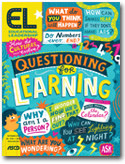In his book The Upright Thinkers (Pantheon, 2015), physicist Leonard Mlodinow recounts a conversation he had with his father, a survivor of the Buchenwald concentration camp. Reflecting on his time in prison, his father recalled an incident when a fellow emaciated inmate, a learned mathematician, showed him a math puzzle. Intrigued, his father, who had only a 7th grade education himself, tried to solve the puzzle, but could not. When he asked for the explanation, the mathematician offered a deal—the solution for a crust of bread. "My father's need to know was so powerful, he parted with his bread in exchange for the answer," the author writes (p. 3).
Mloldinow's book explores our pursuit of questions from the ancient times of food gatherers and toolmakers up through our own times shaped by digital communication and quantum science. "We are the species whose trademark is to think and question," he writes. "Only we, due to the power of our minds, have met all survival challenges (thus far)" (p. 11). Humans, he notes, have another amazing propensity: to teach one another. Unlike other animals—from lizards to chimps, dolphins to elephants—humans learn through sharing ideas and looking for answers together. We are the species that asks.
This issue is all about questioning for learning—how to ask questions of students, how to encourage students to ask their own questions, and how to ask better questions and find better answers. Among topics explored in this issue are why children, who start questioning almost as soon as they learn to talk, ask far fewer questions when they get to school.
Paul Harris describes the findings of research analyses of extensive transcripts of children's natural speech. Some of the studies show the amazing number of questions that children typically ask at home (an average of 25 questions per hour). And interestingly, the more satisfactory answers the children receive, the more questions they pose. At school, however, as another study finds, teachers ask 30 times as many questions as their students do. Harris concludes that if teachers become more aware of questioning patterns in their classrooms, they would be able to create conditions that encouraged more student questions.
Authors in this issue also discuss how feasible it is to encourage questioning in the age of standards and pacing guides, as well as how often adults should answer questions as opposed to guiding students to find the answers on their own. Alfie Kohn believes that students' questions should be the primary driver of their learning and that teachers should model and encourage a skeptical disposition. Others from Susan Brookhart to Dylan Wiliam to Cris Tovani point out how teachers can use a blend of teacher and student questions to understand how students think as well as to help them think more clearly.
No doubt questioning for learning is a subject that gets to the very heart of schooling, as the late great thinker Grant Wiggins wrote long ago in Educational Leadership. In "The Futility of Trying to Teach Everything of Importance" (November 1989), he grappled with the dilemma of either loading students with "essential content" and risking their being overwhelmed or uninterested, or aiming at a more modest target and leaving out far too much. His essential insight was to organize the curriculum around essential questions in such a way as to represent "the (incomplete and always provocative) answers." That way, "students would leave school with the passion to question, without the fear of looking foolish, and with the knowledge to learn where and how the facts can be found."
Shortly before his untimely death, Grant and his cowriter and wife Denise Wilbur followed up on the exploration of essential questions, suggesting seven ways to question your questions. These include identifying the hard-to-understand but vital connections of ideas; posing a question more generally about concepts such as friendship, war, ecosystems, and so on; and familiarizing yourself with the most commonly misunderstood aspects of the subjects you teach and building your questions around them.
Getting the questions right takes discipline, skill, and artfulness, they write. But it's well worth the effort to ensure that students tackle important, intriguing, and revealing questions—the kind that will help humankind survive and thrive.


